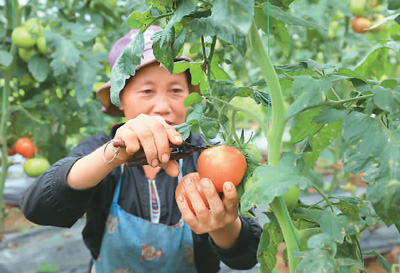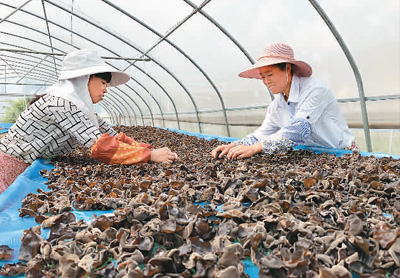


Relocated children embrace a new and happy life at a kindergarten in Nayong county and adapt to the new environment very well.
As hardened roads appear in villages across Nayong county, Bijie city, southwest China’s Guizhou province, people are embracing a positive change.
Yingdi is one of the most impoverished villages in Nayong. It used to take villagers an entire day to make a trip to the county center. But now, the time has been slashed to less than 2 hours.
Before, potatoes and corn were the only cash crops that villagers could grow. Due to a low yield, the vegetables could only keep people from hunger, unable to generate enough to make money.
In 2016, Nayong county rolled out a mechanism to upgrade poverty reduction industries. Thanks to government allowances and a unique bank loan project, a farmer named Meng Zhongfu received 50,000 yuan in financial support to build his pig cultivation business.

A villager picks tomatoes in a village of Nayong county.
The pig farming business generates about 30,000 to 40,000 yuan a year, which Meng explained was previously impossible.
Now, poverty alleviation industries have flourished in Yingdi village, including animal husbandry and chili pepper, chestnut, and plum cultivation. In 2017, Yingdi village was removed from the list of extremely impoverished areas in China.
For areas unsuitable for agricultural development, Bijie decided to relocate people and create tailored solutions for them to shake off poverty.
Gao Yun, secretary of the Party’s Nayong working committee, said that out of 21,398 people who have been relocated, 15,516 were employed through channels such as charity, poverty alleviation workshops and self-employment. The figure indicates that at least one member of each household was reemployed.
Nayong has made great efforts to preserve its ecological environment. Through planting trees, Shedongguan township has significantly reduced water loss and soil erosion, restored grass coverage, and raised the forest coverage rate to 76.3 percent.

Nayong villagers dry black fungus.
Last year, the net income per farmer in Shedongguan township stood at 11,372 yuan, and 5,699 people from 1,778 households rose above the poverty line, bringing the poverty incidence rate down by 9.61 percent, according to local cadre Yang Jie.
Shedongguan has built an industry centered on cherries, bringing economic benefits to residents. This year, the township has so far received more than 1 million tourists, and achieved tourism revenue of more than 50 million yuan.
As President Xi said, lucid waters and lush mountains are invaluable assets. Over the past 30 years’ efforts of poverty alleviation, Bijie has brought its poverty incidence rate down from 56 percent to 5.45 percent, and increased forest coverage from 14.9 percent to 54.2 percent.
In the same period, the disposable income of urban residents in Bijie grew from 795 yuan to 29,888 yuan, while disposable income for the city's rural residents increased from 376 yuan to 9,345 yuan.
 Fire brigade in Shanghai holds group wedding
Fire brigade in Shanghai holds group wedding Tourists enjoy ice sculptures in Datan Town, north China
Tourists enjoy ice sculptures in Datan Town, north China Sunset scenery of Dayan Pagoda in Xi'an
Sunset scenery of Dayan Pagoda in Xi'an Tourists have fun at scenic spot in Nanlong Town, NW China
Tourists have fun at scenic spot in Nanlong Town, NW China Harbin attracts tourists by making best use of ice in winter
Harbin attracts tourists by making best use of ice in winter In pics: FIS Alpine Ski Women's World Cup Slalom
In pics: FIS Alpine Ski Women's World Cup Slalom Black-necked cranes rest at reservoir in Lhunzhub County, Lhasa
Black-necked cranes rest at reservoir in Lhunzhub County, Lhasa China's FAST telescope will be available to foreign scientists in April
China's FAST telescope will be available to foreign scientists in April "She power" plays indispensable role in poverty alleviation
"She power" plays indispensable role in poverty alleviation Top 10 world news events of People's Daily in 2020
Top 10 world news events of People's Daily in 2020 Top 10 China news events of People's Daily in 2020
Top 10 China news events of People's Daily in 2020 Top 10 media buzzwords of 2020
Top 10 media buzzwords of 2020 Year-ender:10 major tourism stories of 2020
Year-ender:10 major tourism stories of 2020 No interference in Venezuelan issues
No interference in Venezuelan issues
 Biz prepares for trade spat
Biz prepares for trade spat
 Broadcasting Continent
Broadcasting Continent Australia wins Chinese CEOs as US loses
Australia wins Chinese CEOs as US loses